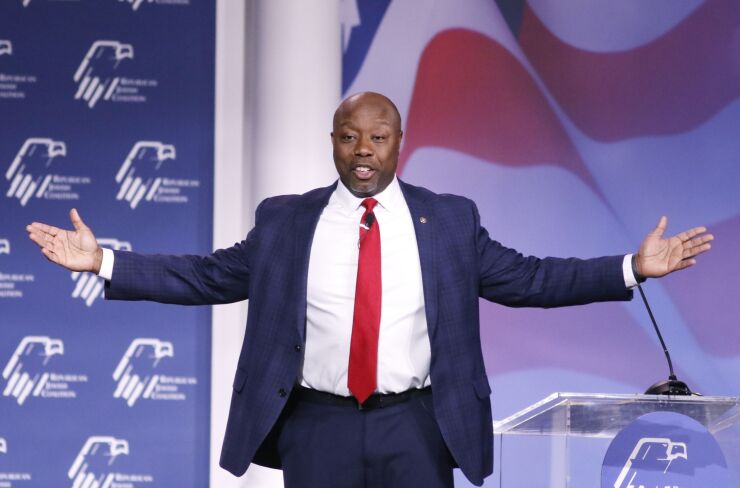
WASHINGTON — The Republican party has long aligned itself more closely with the banking industry than their Democratic counterparts, siding with industry interests on issues such as capital requirements and looser regulatory oversight.
But a
Sen. Tim Scott, R-S.C., the new ranking member of the Senate Banking Committee, is the first lawmaker to lead his party on a banking panel in either the Senate or the House who was elected after Dodd-Frank was passed in 2010. Before becoming the ranking member of the committee, Scott's primary focus was on housing issues, although since taking the top Republican seat on the panel he's stressed some of the same points as his predecessors.
"As Ranking Member, Sen. Scott will continue his work to put economic opportunity within reach for more Americans by expanding access to credit, increasing capital formation, and shaping a more inclusive and innovative financial system," a spokesperson for Scott said. "Part of that work will include rigorous oversight of the Biden administration's opportunity-stifling regulatory agenda, scrutiny of problematic elements of the Dodd-Frank Act, and ensuring continued implementation of the tailoring requirements in the bipartisan Economic Growth, Regulatory Relief, and Consumer Protection Act."
Still, the fact that a lawmaker elected after Dodd-Frank is now the party's leading voice on banking issues has significant consequences for the rhetoric and future of the Republican party and their alignment with the interest of the banking industry.
Previous GOP leaders of banking and financial committees — including Sens. Mike Crapo of Idaho, Pat Toomey of Pennsylvania and Rep. Jeb Hensarling of Texas — had their thinking and policymaking sharpened by the debates around Dodd-Frank, said Saat Alety, a partner at Federal Hall Policy Advisors and former staffer for Scott.
"They kind of have the scars and memory from the financial crisis, from seeing the TARP votes, from the decision to place Fannie and Freddie into conservatorship — they have the scars, they have the memories from those battles. It's clear to me that ten to 15 years later, that's going to influence some of your policy making. Whereas for Senator Scott, he was not in a decision-making role during that economic meltdown, as it predated his time in Congress."
That's influenced Scott's thinking on issues like affordable housing, a unique issue for a banking Republican to champion.
"For Scott and for Republicans in general who came in after the Dodd-Frank Act, it's clear that Fannie Mae and Freddie Mac are not viewed the same way," Alety said. "I feel there's a different view of the [GSE] conservatorship, of the government having such a heavy presence in housing, which I think Republicans who were elected before Dodd-Frank recoiled from and targeted."
Part of this shift is simply because banks have become less politically controversial, said Bert Ely, principal at Ely & Co. While concerns linger around equity issues such as the Community Reinvestment Act, it's easier for lines to blur when most high-stakes issues for industry aren't front-of-mind for most voters.
"In recent years, the banks have been in pretty good shape," he said. "There's some concern about a possible uptick in asset quality problems, but things are really pretty calm in the banking industry from a safety and soundness standpoint."
The changes extend beyond Scott to newcomers to the Senate Banking Committee, such as Sen. J.D. Vance, R-Ohio, who's criticized the impact that private equity has had on the housing market, as well as some conservative Republicans in the House, said Oren Cass, the founder of American Compass which promotes conservative, economic populist ideas.
"There's been a real breakup between the party and just conservatism generally, between the Wall Street, Chamber of Commerce, interest groups that in the past Republicans would have been inclined to carry a lot of water for," he said.
While a split Congress means that Scott's ascension to ranking member of the Senate Banking Committee isn't likely to change whatever legislation comes out of Congress in the next two years, it could signal that policy discussions in the future could look very different than those just a year ago.
"What you're seeing in the rhetoric today speaks to a very substantive shift that's going to mean a lot in future policy debates," Cass said. "When in the past you've had Democrats pushing especially hard and you've had Republicans pushing back super hard, you're just not going to have the Republicans pushing back."
To Cass, that means that financial services, if current trends continue, could have more political risk in the future.
"So there's a very different and higher-risk policy environment for the financial industry in that they are politically exposed from all sides at this point," he said. "But on top of that, you're going to see conservatives picking entirely new fights, like those around ESG. There's a real appetite right of center for trying to reign in a lot of these financial market actors that don't seem especially productive in the real economy."





